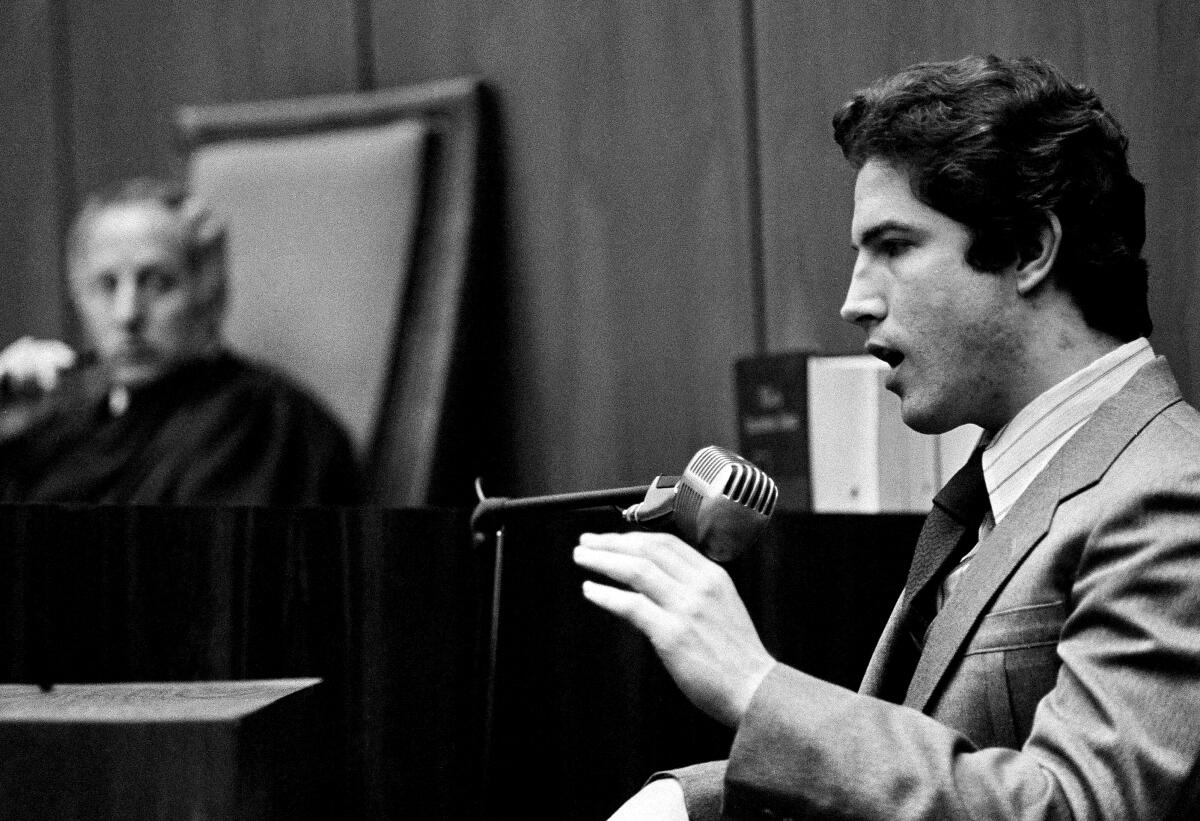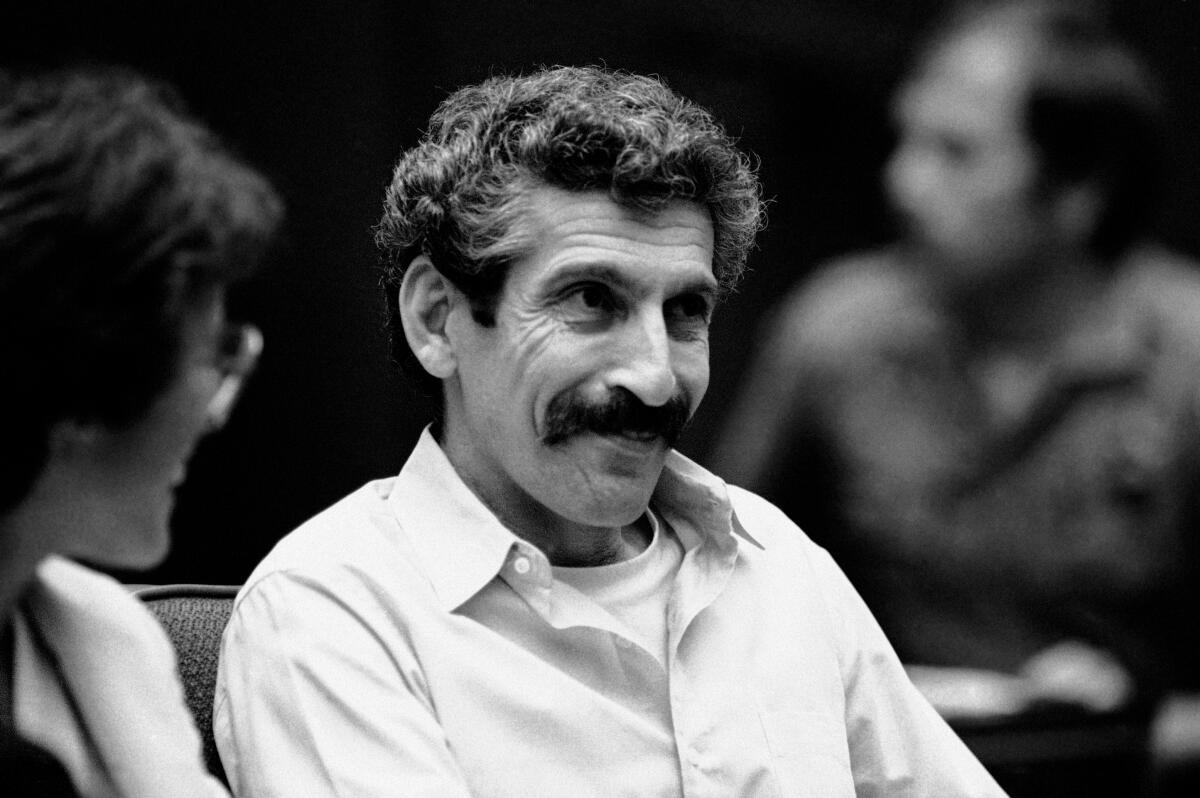How the Hillside Strangler case helped make L.A. ‘serial killer capital of America’

- Share via
Los Angeles has been called many things: City of Angels, Tinseltown, La La Land. But it also gained a name for a decidedly less glamorous distinction in the 1970s and 1980s: Serial Killer Capital of America. In the decades between the 1969 Manson Family murders and the 1989 conviction of Richard Ramirez, a.k.a. the Night Stalker, there were so many serial murders to keep track of that traumatized Angelenos needed a flow chart to keep up. There was the Skid Row Stabber. The Sunset Strip Killer. The West Side Rapist. The Toolbox Killers. The Grim Sleeper. The Freeway Killer. (“He” ended up being three killers who committed a string of separate murders.) During this period, more than 20 serial killers were reportedly operating simultaneously in Los Angeles.
A four-part true crime docuseries premiering Tuesday on Peacock focuses on one of the more notorious cases to rise out of that dark era. “The Hillside Strangler: Devil in Disguise” revisits the killing spree of the so-called Hillside Strangler, a phantom behind the killings of 10 women in Los Angeles in 1977 and 1978. The city was gripped with fear as body after body was found dumped in the hills above Glendale and Eagle Rock, near Dodger Stadium in Elysian Heights, on a residential street in La Crescenta, near a freeway offramp in Los Feliz.
Netflix’s four-part docuseries “Night Stalker: The Hunt for a Serial Killer” deftly captures a time and place that many Angelenos will never forget.
“Devil in Disguise” is not as powerful or haunting as Netflix’s “Night Stalker: The Hunt for a Serial Killer,” but it’s equally as fascinating in its deep exploration of another notorious crime that captured the city‘s imagination. It chronicles the homicides of victims ranging in age from 12 to 28 and the extensive investigation by law enforcement, as well as the mindset of the men ultimately convicted of the slayings, cousins Kenneth Bianchi and Angelo Buono.
The story is told primarily via exclusive new interviews with those close to the case, such as Bianchi’s former girlfriend, and archival footage, including local news clips of reporters covering the latest developments in the Hillside Strangler slayings.

Footage of interrogation sessions with Bianchi stand out here, taking this series deep into the mind of a sociopath who killed at least 12 women (two of them in Bellingham, Wash.) before his 1979 capture. Bianchi presents as a charming, mild-mannered and clean-cut young man who once worked as a security guard. Psychiatrists who thought they’d hypnotized Bianchi diagnosed him with dissociative identity disorder, claiming a personality separate from himself committed the murders. The filmed sessions were the basis for an insanity defense — until other mental health experts discovered that Bianchi was a master manipulator and compulsive liar who had faked his hypnosis.
Bianchi’s girlfriend at the time of the Los Angeles killings, Eagle Rock resident Sheryl Kellison, is also featured throughout the series. She was 17 when they began dating and said that her 25-year-old boyfriend appeared to be thoughtful and courteous, even though he never revealed much about himself. She would visit him at his cousin’s auto upholstery business in Glendale, which homicide detectives later determined was the scene of the killings. She said that Buono was strange and withdrawn, but she had no idea the men were orchestrating their reign of terror out of the shop.
The first season of the streamer’s new anthology docuseries, “Crime Scene,” falls too in love with the Cecil’s lore to tell its central story effectively.
The cousins resided in a house located next to the shop on Colorado Boulevard, a location that still serves as an auto body garage today. They allegedly impersonated police officers to lure in their victims from nearby locales — an RTD bus bench in Eagle Rock, the Tamarind Terrace apartments in Hollywood — before raping, torturing and murdering them, then discarded their bodies on hillsides around the city. Sex workers were their earliest victims, a high-risk population that didn’t draw much press when they turned up dead. But when two young girls were found murdered after they never returned from a trip to the mall, investigators launched an intensive manhunt.
Multiple interviews with those close to the case paint a vivid picture of a city on edge and the desperate effort to end the carnage. Among those interviewed are former LAPD and Glendale homicide detectives and other law enforcement; family members of the victims; a former reporter; a juror from the Buono trial; and playwright Veronica Compton, who served time after attempting a copycat killing meant to cast Bianchi, with whom she was in a relationship, as wrongly convicted.
“Devil in Disguise” points out that the Hillside Strangler case is the longest criminal trial in U.S. history, concluding with Angelo Buono’s trial in 1983. Another dubious distinction for Los Angeles, the city good true-crime documentaries are made of.
More to Read
The complete guide to home viewing
Get Screen Gab for everything about the TV shows and streaming movies everyone’s talking about.
You may occasionally receive promotional content from the Los Angeles Times.







